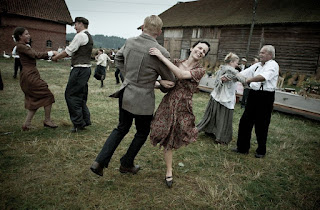Polish Cinema: Rose (Wojciech Smarzowski, 2011, Poland)
Rose (Róża) is the third directorial feature by Polish director Wojciech Smarzowski. The director's first period piece takes place in former German East Prussia immediately following Germany's defeat in WWII. The film centers on two characters. Tadeusz, played by Marcin Dorociński, is a soldier in the Polish Home Army, who is invited to live in the home of Róża, a Masurian woman played by Agata Kulesza. Róża invites him to stay with him to defend her from the rapes perpetrated by the occupying Russian forces. This depiction of the lawlessness of the immediate postwar period caused it to be banned in Russia.
As the film progresses, Róża is under increasing pressure from the NKVD. The Masurians, a largely Protestant group who were both German and Polish speaking, were looked on with suspicion by the Russians and forced to evacuate from former East Prussia. We see Róża come under increasing assaults, as well as the overall community of Masurians, under the leadership of the local Pastor. The events of the film play out like a Western, with Tadeusz as well under increasing suspicion from local NKVD members for his allegiances.
Few films capture the bleakness and lawlessness of the post-War period in Poland like Smarzowski's film. While the film plays as a Western for the most part, it ultimately ends in a deeply tragic way, as Roża falls ill due to one of the many rapes she has suffered. The film is almost unbearably grim, although it manages to stay engaging through the performances of the two leads, who are among the best performers of contemporary Polish cinema. Rose should be mandatory watching for those interested in Polish history, but also for those interested in contemporary Polish cinema's handling of the past. It is a remarkably powerful film about a doomed people.
8/10




Comments
Post a Comment